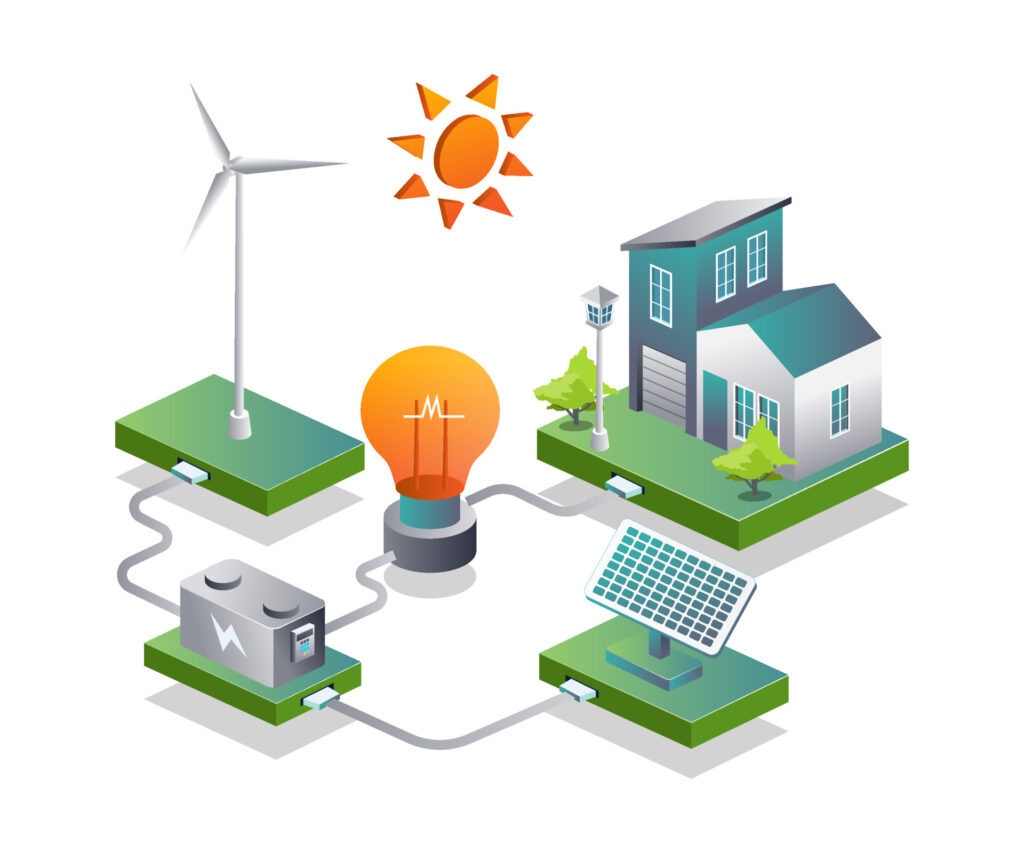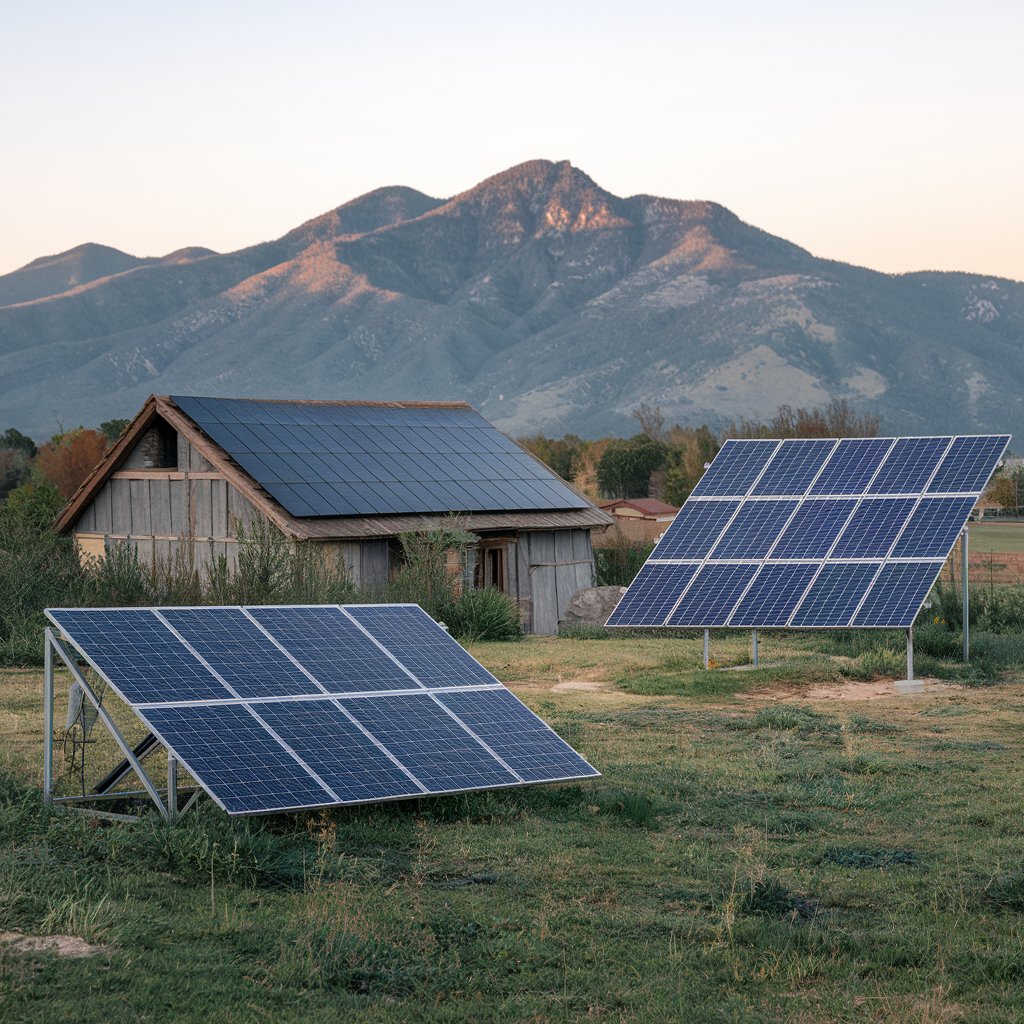On-grid and off-grid systems are the two possibilities you’ve most likely come across if you’re thinking about installing solar for your house or place of business. However, which is most appropriate for you? The decision is not merely technical; it may have many effects on the environment, your energy expenses, and your level of independence. To assist you in making an informed choice, let’s thoroughly examine the distinctions, advantages, and difficulties of each.

Choosing Between Off-Grid and On-Grid Solar Systems: An Uncertainty
Many homeowners and corporate executives who are considering solar may feel overwhelmed by the wealth of information available. Off-grid systems promise independence and autonomy, but on-grid solutions provide a sense of security and maybe lower setup costs. What is the one that best meets your needs?
Given the long-term effects, this choice becomes even more urgent. Since installing a solar system is a significant financial commitment, you should plan it to fit your lifestyle, energy consumption habits, and financial objectives. To make this decision easier, we’ll explain each system’s operation, provide examples of practical applications, and weigh the advantages and disadvantages to help you decide which system could be the best fit for you.
Difficulties in Selecting the Best Solar Option
1.Complexity of Costs and Savings: Off-grid systems do not have recurring utility rates, but they do demand a larger initial investment. On-grid systems, on the other hand, can reduce energy expenses.
2.Dependency vs. Independence: Because on-grid solutions maintain your connection to the grid, you are not concerned about the availability of power. However, this dependence has a price because you continue to be connected to (and pay) the utility provider. Conversely, off-grid systems are completely independent, but they could leave you without power if the batteries run low.
3.Environmental Issues: Although both systems have advantages for the environment, their effects on the environment differ depending on regional resources and usage trends. For instance, while on-grid systems help distribute energy, depending solely on an off-grid system with batteries may require more complicated recycling requirements.
Comprehensive Analysis of Off-Grid and On-Grid Systems
Gaining Knowledge of Off-Grid and On Grid Solar Systems:
On grid System:-
The local utility grid is linked to an on-grid, or grid-tied, solar system. Through a procedure called net metering, this system uses solar panels to create power and returns any excess energy to the grid, which in many places can be credited to your account.
How It work:-
Your house or place of business is powered by the energy that solar panels produce during the day.
The utility grid receives the excess power. You will often be credited for this, which will lower your electricity cost.
Power is taken from the grid to ensure a steady supply during the evening or overcast days when solar generation is at its lowest.
Benefits of This System:
Reduced Initial Costs: Since on-grid systems don’t need a battery backup, they are typically less expensive than off-grid systems.
Saving Money on Bills with Net Metering: Any extra power can be credited to your account through net metering, which lowers your utility cost.
Energy Reliability: You have a consistent supply of electricity even if your solar panels aren’t producing any. This is because the grid serves as a backup.
Grid Dependency: Unless your system has a battery (which is less frequent in typical on-grid systems), you will also be without power in the event of a grid outage.
Potentially Unstable Rates: Over time, your savings may be impacted by changes in the cost of grid electricity.
Off grid System:
An off-grid system produces, stores, and provides all of its energy requirements on its own since it is completely cut off from the utility grid.
How Off-Grid Systems
Energy produced by solar panels is instantly utilized by the residence or place of company.
A battery system stores extra energy for usage when there isn’t any sunlight.
The system will have no alternative power source when the battery’s stored energy runs out.
Benefits Of Off Grid System:
1.Energy Independence: Because off-grid systems are completely self-sufficient, they are perfect for isolated areas or people who desire complete control over their energy use.
2.No Utility Bills: You do not have to pay monthly electric bills because you are not a part of the grid.
3.Environmental Benefits: Off-grid solutions lessen reliance on grid power derived from fossil fuels, particularly when batteries are properly recovered.
Disadvantages of off-grid systems
1.Higher Upfront Costs: Generally speaking, off-grid systems demand a bigger battery storage investment.
Battery replacement and maintenance are necessary, which raises the overall cost over time.
2.Risk of Power Outage: Until solar generation starts up again, you won’t have any electricity if your battery storage runs out.
How Each System Performs in Real Life
Rural Farm in Maharashtra – Off-Grid System
To power their operations, the owners of a farm in Maharashtra set up an off-grid solar system. Their remote location and the expensive cost of connecting the farm to the electric grid were the main factors in their decision to go off the grid. They were able to power basic appliances, water pumps, and lighting with an 8 kW off-grid solar system and battery backup.
Results and Benefits:
Financial Independence: The farm owners reported that, despite the substantial initial setup costs (about INR 7 lakhs), the savings on utility bills allowed them to recoup their investment in just six years.
Dependable Power Source: Their solar batteries guarantee power availability even on overcast days, which is essential for operating their pumps and caring for their crops.
Challenges
High Maintenance: The batteries needed to be changed every five years and needed to be maintained frequently, which increased the continuing expenses.
Energy Management: They had to cut back on their energy use on days with less sunlight, which emphasizes the necessity of using off-grid systems with a cautious attitude to power consumption.
Urban Residential Building in Pune – On-Grid System
A 10 kW on-grid solar system was installed in a Pune residential building to lower the residents’ monthly power bills. An on-grid system was more economical because the building already had a dependable grid connection, which allowed them to feed extra energy back into the grid for credits.
Results and Benefits
Reduced Utility Bills: The building’s monthly electricity expenses were reduced by up to 40% thanks to net metering, which paid for itself in about four years.
Minimal Maintenance: Only occasional panel cleaning was necessary, and the building’s maintenance expenditures were minimal because no battery backup was needed.
Challenges
Grid Dependency: Because the on-grid system lacked a battery backup, the occupants had to endure blackouts when the grid went down.
Limited Autonomy: Because of their grid connection, they were still susceptible to future increases in electricity rates, which might have an effect on their savings.
Key Comparisons to Help You Decide
| Feature | On-Grid System | Off-Grid System |
|---|---|---|
| Cost | Lower upfront costs, no batteries needed | Higher upfront costs due to batteries |
| Maintenance | Low (mainly panel cleaning) | Moderate to high (battery maintenance) |
| Utility Bills | Reduced bills with net metering | No bills, as not connected to the grid |
| Energy Independence | Dependent on the grid | Fully independent |
| Reliability | Reliable with grid, but outages affect it | Can run without the grid, limited by battery capacity |
| Environmental Impact | Lower impact, especially with net metering | Higher impact due to battery disposal needs, but fully renewable |
The Best Use Cases for On-Grid Are:
Urban or Suburban Residences and Companies On-grid systems are an affordable option for going solar and reducing monthly rates if you have access to grid electricity.
Those Seeking to Reduce Upfront Expenses: On-grid systems can be less expensive to install because they don’t require a battery.
In locations where utility services are dependable: An on-grid system can save a lot of money without requiring a backup if the grid is steady.
Off-Grid Is Best For:
Remote Locations: The independence of an off-grid system might be advantageous for residences and businesses in remote areas or locations without dependable grid connectivity.
Environmentally Aware Users: Off-grid technologies completely remove grid dependency for users dedicated to renewable energy independence.
People Willing to Invest in Batteries and Maintenance Off-grid solutions provide a completely independent energy alternative if you can afford the initial investment and continuing maintenance of batteries.
In the end, deciding between an off-grid and on-grid solar system depends on how well your lifestyle, finances, and energy requirements match. An off-grid setup might be perfect if you want autonomy and have the money to maintain your batteries. On the other hand, an on-grid system is most likely your best option if you’re searching for an affordable solution to reduce electricity costs without compromising dependability.
The response to the question “which is best?” varies depending on the circumstances. However, with the help of this guide, you can make a decision that supports your objectives, provides long-term value, and benefits the environment and your pocketbook.
Some Related Question
1.What is the difference between hybrid, on-grid, and off-grid solar systems?
Answer: Hybrid systems combine elements of both on-grid and off-grid systems by connecting to the grid and including battery storage. They provide the benefits of backup power during outages, while also allowing excess energy to be sent to the grid
2.How much does it cost to install an on-grid versus an off-grid solar system?
Answer: On-grid systems generally have lower initial costs because they don’t require batteries. Off-grid systems, however, need a robust battery setup, making them more expensive upfront. Costs vary widely depending on system size, battery type, and location.
3.Can I switch from an on-grid to an off-grid solar system in the future?
Answer: Yes, many on-grid systems can be adapted to go off-grid by adding batteries and modifying the inverter. However, this process can be costly and may require technical upgrades to support complete energy independence.
4.What type of maintenance is required for on-grid and off-grid systems?
Answer: On-grid systems are generally low-maintenance, requiring only occasional cleaning of solar panels. Off-grid systems require more maintenance due to battery upkeep and replacement, especially if they use lead-acid batteries.
5.How long do batteries last in an off-grid solar system, and when should they be replaced?
Answer: Battery life varies by type. Lead-acid batteries last 5-7 years on average, while lithium-ion batteries can last 10-15 years but come at a higher cost. Regular maintenance and optimal charging practices can help extend battery life.

